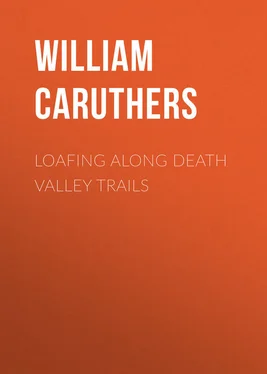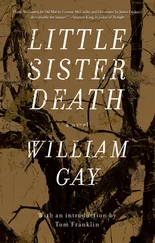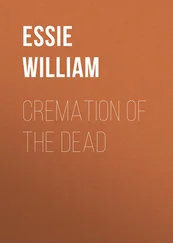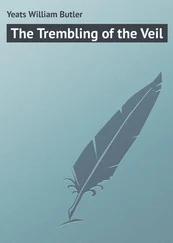William Caruthers - Loafing Along Death Valley Trails
Здесь есть возможность читать онлайн «William Caruthers - Loafing Along Death Valley Trails» — ознакомительный отрывок электронной книги совершенно бесплатно, а после прочтения отрывка купить полную версию. В некоторых случаях можно слушать аудио, скачать через торрент в формате fb2 и присутствует краткое содержание. Жанр: foreign_language, foreign_prose, на английском языке. Описание произведения, (предисловие) а так же отзывы посетителей доступны на портале библиотеки ЛибКат.
- Название:Loafing Along Death Valley Trails
- Автор:
- Жанр:
- Год:неизвестен
- ISBN:нет данных
- Рейтинг книги:5 / 5. Голосов: 1
-
Избранное:Добавить в избранное
- Отзывы:
-
Ваша оценка:
- 100
- 1
- 2
- 3
- 4
- 5
Loafing Along Death Valley Trails: краткое содержание, описание и аннотация
Предлагаем к чтению аннотацию, описание, краткое содержание или предисловие (зависит от того, что написал сам автор книги «Loafing Along Death Valley Trails»). Если вы не нашли необходимую информацию о книге — напишите в комментариях, мы постараемся отыскать её.
Loafing Along Death Valley Trails — читать онлайн ознакомительный отрывок
Ниже представлен текст книги, разбитый по страницам. Система сохранения места последней прочитанной страницы, позволяет с удобством читать онлайн бесплатно книгу «Loafing Along Death Valley Trails», без необходимости каждый раз заново искать на чём Вы остановились. Поставьте закладку, и сможете в любой момент перейти на страницу, на которой закончили чтение.
Интервал:
Закладка:
So Aaron Winters chose his mate from the available supply and with Rosie, part Mexican and Indian, part Spanish, he settled in Ash Meadows in a dugout. In front and adjoining had been added a shack, part wood, part stone. The floors were dirt. Rosie dragged in posts, poles, and brush and made a shed. Aaron found time between hunting and trapping to add a room of unmortared stone. At times there was no money, but piñon nuts grew in the mountains, desert tea and squaw cabbage were handy and the beans of mesquite could be ground into flour.
Rosie, to whom one must yield admiration, was not the first woman in Winters’ life. “He liked his women,” Ed Stiles recalled, “and changed ’em often.” But to Rosie, Aaron Winters was always devoted. Her material reward was little but all who knew her praised her beauty and her virtues.
One day when dusk was gathering there was a rap on the sagging slab door and Rosie Winters opened it on an angel unawares. The Winters invited the stranger in, shared their meager meal. After supper they sat up later than usual, listening to the story of the stranger’s travels. He was looking for borax, he told them. “It’s a white stuff…” At this time, only two or three unimportant deposits of borax were known to exist in America and the average prospector knew nothing about it.
The first borax was mined in Tibet. There in the form of tincal it was loaded on the backs of sheep, transported across the Himalayas and shipped to London. It was so rare that it was sold by the ounce. Later the more intelligent of the western prospectors began to learn that borax was something to keep in mind.
To Aaron Winters it was just something bought in a drug store, but Rosie was interested in the “white stuff.” She wanted to know how one could tell when the white stuff was borax. Patiently the guest explained how to make the tests: “Under the torch it will burn green…”
Finally Rosie made a bed for the wayfarer in the lean-to and long after he blew out his candle Rosie Winters lay awake, wondering about some white stuff she’d seen scattered over a flat down in the hellish heat of Death Valley. She remembered that it whitened the crust of a big area, stuck to her shoes and clothes and got in her hair when the wind lifted the silt.
The next morning Rosie and Aaron bade the guest good luck and goodbye and he went into the horizon without even leaving his name. Then Rosie turned to Aaron: “Maybe,” she said … “maybe that white stuff we see that time below Furnace Creek – maybe that is borax.”
“Might be,” Aaron answered.
“Why don’t we go see?” Rosie asked. “Maybe some Big Horn sheep – ” Rosie knew her man and Aaron Winters got his rifle and Rosie packed the sow-belly and beans.
It was a long, gruelling trip down into the valley under a Death Valley sun but hope sustained them. They made their camp at Furnace Creek, then Rosie led Aaron over the flats she remembered. She scooped up some of the white stuff that looked like cotton balls while Aaron prepared for the test. Then the brief, uncertain moment when the white stuff touched the flame. Tensely they watched, Aaron grimly curious rather than hopeful; Rosie with pounding heart and lips whispering a prayer.
Then, miracle of miracles – the green flame. They looked excitedly into each other’s eyes, each unable to believe. In that moment, Rosie, always devout, lifted her eyes to heaven and thanked her God. Neither had any idea of the worth of their find. Vaguely they knew it meant spending money. A new what-not for Rosie’s mantel. Perhaps pine boards to cover the hovel’s dirt floor; maybe a few pieces of golden oak furniture; a rifle with greater range than Aaron’s old one; silk or satin to make a dress for Rosie.
“Writers have had to draw on their imagination for what happened,” a descendant of the Winters once told me. “They say Uncle Aaron exclaimed, ‘Rosie, she burns green!’ or ‘Rosie, we’re rich!’ but Aunt Rosie said they were so excited they couldn’t remember, but she knew what they did! They went over to the ditch that Bellerin’ Teck had dug to water the ranch and in its warm water soaked their bunioned feet.”
Returning to Ash Meadows they faced the problem of what to do with the “white stuff.” Unlike gold, it couldn’t be sold on sight, because it was a new industry, and little was known about its handling. Finally Aaron learned that a rich merchant in San Francisco, named Coleman was interested in borax in a small way and lost no time in sending samples to Coleman.
W. T. Coleman was a Kentucky aristocrat who had come to California during the gold rush and attained both fortune and the affection of the people of the state. He had been chosen leader of the famed Vigilantes, who had rescued San Francisco from a gang of the lawless as tough as the world ever saw.
Actually Coleman’s interest in borax was a minor incident in the handling of his large fortune and his passionate devotion to the development of his adopted state. For that reason alone, Coleman had become interested in the small deposits of borax discovered by Francis Smith, first at Columbus Marsh.
Smith had been a prospector before coming to California, wandering all over western country, looking for gold and silver. He was one of those who had heard that borax was worth keeping in mind.
Reaching Nevada and needing a grubstake, he began to cut wood to supply mines around Columbus, Aurora, and Candelaria. On Teel’s Marsh he found a large growth of mesquite, built a shack and claimed all the wood and the site as his own. Upon a portion of it, some Mexicans had cut and corded some of the wood and Smith refused to let them haul it off. They left grudgingly and with threats to return. The Mexicans, of course, had as much right to the wood as Smith.
Sensing trouble and having no weapons at his camp, he went twelve miles to borrow a rifle. But there were no cartridges and he had to ride sixty miles over the mountains to Aurora where he found only four. Returning to his shack, he found the Mexicans had also returned with reinforcements. Twenty-four were now at work and their mood was murderous. Smith had a companion whose courage he didn’t trust and ordered him to go out in the brush and keep out of the way.
The Mexicans told Smith they were going to take the wood. Smith warned that he would kill the first man who touched the pile. With only four cartridges to kill 20 men, it was obviously a bluff. One of the Mexicans went to the pile and picked up a stick. Smith put his rifle to his shoulder and ordered the fellow to drop it. Unafraid and still holding the stick the Mexican said: “You may kill me, but my friends will kill you. Put your rifle down and we will talk it over.”
They had cut additional wood during his absence and demanded that they be permitted to take all the wood they had cut. Smith consented and when the Mexicans had gone he staked out the marsh as a mining claim – which led to the connection with Coleman.
Upon receipt of Winters’ letter, Coleman forwarded it to Smith and asked him to investigate the Winters claim. Smith’s report was enthusiastic. Coleman then sent two capable men, William Robertson and Rudolph Neuenschwander to look over the Winters discovery, with credentials to buy. Again Rosie and Aaron Winters heard the flutter of angel wings at the hovel door. This time the angels left $20,000. Rarely in this world has buyer bought so much for so little, but to Aaron and Rosie Winters it was all the money in the world.
Despite the troubles of operating in a place so remote from market and with problems of a product about which too little was known, borax was soon adding $100,000 a year to Coleman’s already fabulous fortune.
Francis M. (Borax) Smith was put in charge of operations under the firm name of Coleman and Smith.
Читать дальшеИнтервал:
Закладка:
Похожие книги на «Loafing Along Death Valley Trails»
Представляем Вашему вниманию похожие книги на «Loafing Along Death Valley Trails» списком для выбора. Мы отобрали схожую по названию и смыслу литературу в надежде предоставить читателям больше вариантов отыскать новые, интересные, ещё непрочитанные произведения.
Обсуждение, отзывы о книге «Loafing Along Death Valley Trails» и просто собственные мнения читателей. Оставьте ваши комментарии, напишите, что Вы думаете о произведении, его смысле или главных героях. Укажите что конкретно понравилось, а что нет, и почему Вы так считаете.












